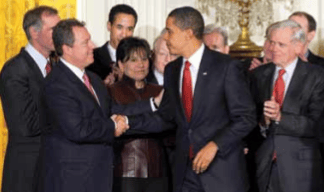Wall Street was in shambles and American workers were beginning to suffer the consequences, with waves of layoffs spread across all sectors. Obama, fresh off his win over McCain in the 2008 Presidential Election, realized he would be taking office under the worst economic conditions any president had faced since the Great Depression. Which is why he was calling Wolf, W’84, for help — and asking him to serve on the newly created Economic Recovery Advisory Board (PERAB), the first board created under execu- tive order reporting directly to the President since President Eisenhower’s Foreign Intelligence Board in 1956. Despite his enormous responsibilities as Chairman and CEO for UBS Group Americas, Wolf accepted.
Q. How did you first became acquainted with President Obama?
A. I first met then-Sen. Obama in late 2006 at the offices of George Soros. The Senator was in New York City to give a speech on child poverty and, prior to the dinner, he met with a group of high-profile Democratic supporters. We started to speak often and had our first one-on-one dinner in early January of 2007 in Washington.
Q. When did you first learn you would be involved in the Economic Recovery Advisory Board? And what was your reaction?
A. Throughout the campaign and once the President was elected on November 4, we had numerous discussions about the economy and financial markets. I learned about my possi- ble appointment directly from the President in late November. I felt that the appointment was a true honor and privilege. With my academic background as a student from Wharton and with 25 years in the financial services industry, I was confi- dent that I could contribute and give constructive ideas and solutions based on my market experience and risk manage- ment expertise.
Q. What exactly is the board’s charge?
A. The goal of the group is to give the President non-partisan, independent advice on how to enhance the strength of our na- tion’s economy and improve the prosperity of our citizens.
Q. Who in the White House are you working with?
How do you feel about the composition of the board?
Did the President bring in the “right” people for this job?
A. I spend most of my time working with a subset of the group that is being tasked to focus on financial market sta- bility and regulation, and on the stimulus package. Our dia- logue is directly with President Obama, Treasury Secretary Tim Geithner, Chairman of the National Economic Council Larry Summers, Senior Advisor Valerie Jarrett and member of the Council of Economic Affairs Austan Goolsbee. The PERAB is quite unique based on its members’ diverse backgrounds and experiences. You really have some of the country’s great minds and personalities.
Q. From your perspective, what drove the U.S. economy to this point? More importantly, how we can we recover?
A. In my view, the main reason we got to where we are today was the deterioration in our standards for extending credit, which led to a rapidly declining real estate market and large losses that forced a shortage of capital and a de-leveraging process at our financial institutions, thus shutting down normal lending practices for consumers and companies. In addition, it is clear now that originators and investors of the myriad of new structured financial products that were being offered didn’t fully understand the risks of those products. The key next steps to resuscitate the country’s financial po- sition start with keeping homeowners in their homes and curbing the foreclosure crisis. We need to quickly restore con- fidence in the financial sector and let the Treasury’s stability plan jump-start the marketplace and economy. I am very confident that our country can come out of this economic crisis. With all of the tools being used by the President working with the Federal Reserve, the Treasury and the FDIC, we will see the rebound begin in late 2009 and throughout 2010.
Q. I know the board was created only recently. But what has been accomplished so far?
A. I am confident we will have an impact in a number of ways. If you look closely at the members of PERAB and our backgrounds, current and past, and who we represent, it is clear that we can give the President and his Administration broad advice on the potential impact of the initiatives they are considering to lead us to an economic recovery. I also expect us to generate ideas that may be different from those that the President hears through normal political channels and, at times, more challenging. That’s the beauty of being inde- pendent. As to whether we will have an impact? I have the utmost faith in President Obama and believe we can help him get this country moving forward toward a recovery and then prosperity. I think we will have an impact and I believe that the President believes this as well.


























